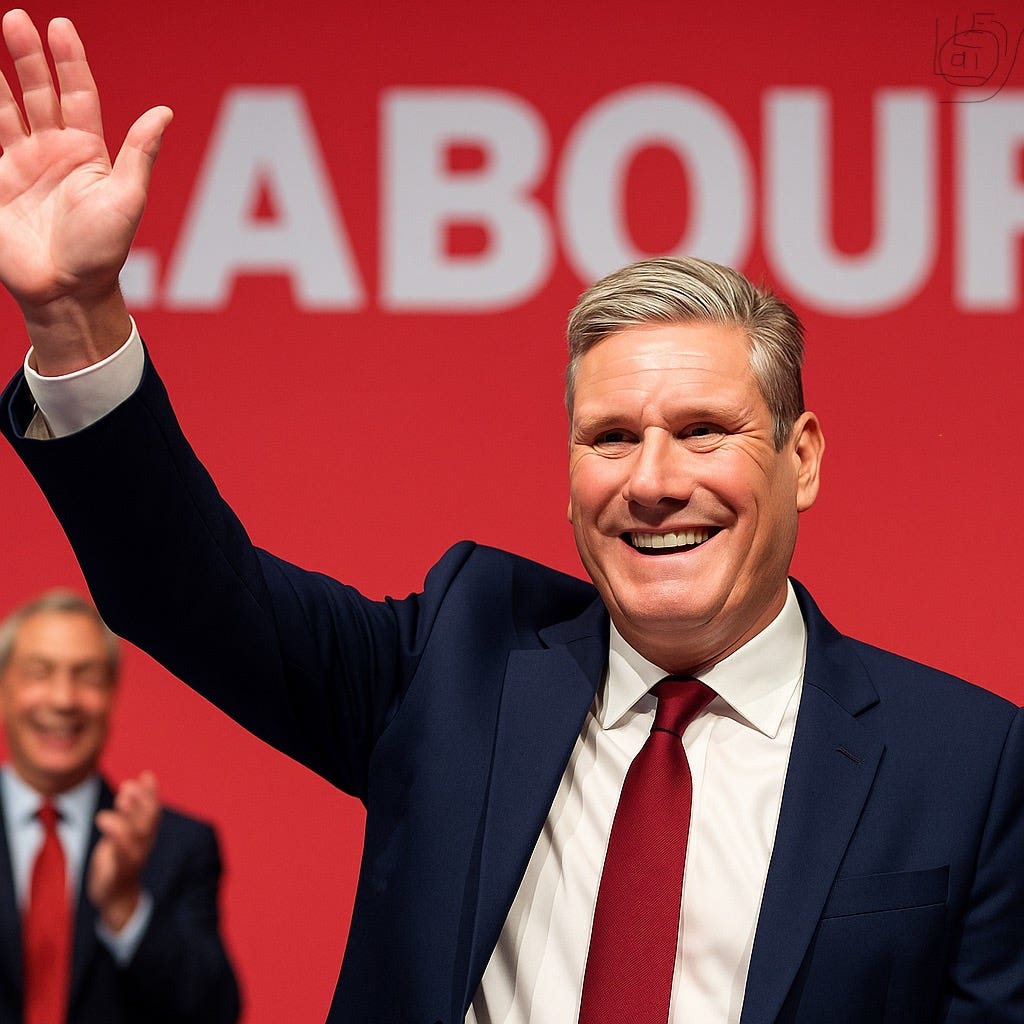When the Showpiece Slips: Starmer the Prime Minister, the Bookies, and the Veil Torn Away
Starmer is still trailing behind Nigel Farage, despite some very human moments in his speech.
Labour’s Liverpool conference was supposed to be a coronation. The banners were immaculate, the speeches polished, the timings to the second. The party machine had one goal: to present Keir Starmer not as a man who had just won power, but as a Prime Minister with authority, direction, and inevitability
And yet, outside the hall, the verdict was more hesitant. The bookmakers’ odds didn’t immediately move in his favour. Starmer is still trailing behind Nigel Farage, despite some very human moments in his speech. The very stagecraft meant to project strength ended up exposing fragility. Liverpool was supposed to be Starmer’s strongest week as Prime Minister. Instead, the markets judged it one of his weakest.
1. The Showpiece Gone Wrong
That is the paradox of modern politics. A conference is meant to reassure voters, to show grip and authority. But when the gloss is laid on too thick, it can have the opposite effect: reminding people of what they doubt.
Starmer’s speech hit its marks, but it didn’t land beyond the hall. His fiercest lines were rehearsed; his warmest moments felt practised. Even when he attacked Farage, the hall roared but the pubs stayed quiet. And punters notice. Bookmakers don’t deal in theory, they deal in money. The fact that Starmer remains behind Farage in the betting markets, even after his conference speech, tells you everything: the conference was theatre, but not persuasion.
2. The Starmer Slump
And this is not just about one week in Liverpool. It is part of a longer trend. Starmer polls as safe but uninspiring, serious but dull. His problem is simple: the more voters see of him, the less they warm to him. Every set-piece appearance confirms the caricature — careful, evasive, managerial.
That lands especially badly when the national mood is sour. People are fed up with NHS queues and GP appointments rarer than lottery wins. They drive over potholes every morning. They watch immigration rows dominate headlines without clear answers. And they ask themselves: what exactly is working in Britain right now? Against that backdrop, a Prime Minister who comes across as managerial rather than inspirational feels like the wrong fit.
The Reynolds Test
You could see the problem play out in miniature on Newsnight. Emma Reynolds was sent out as the face of Labour’s “tougher” stance — the new voice of credibility on issues like migration and tax. But under Victoria Derbyshire’s quiet, relentless questioning, the line fell apart.
The flashpoint came over National Insurance. Reynolds insisted Labour hadn’t put it up. Derbyshire pressed: you did, on employees’ contributions — isn’t that putting it up? Reynolds shook her head, smiled, tried to hold the line. But the facts were plain, and the denial made her look slippery.
It was the moment the mask slipped. The smile didn’t save her; it only underlined the gap between message and reality. And in that slip, you saw the old Labour habits: evasive answers, managerial spin, the instinct to deny what voters can see with their own eyes.
And here’s the deeper problem: Reynolds is a product of Labour’s grooming of candidates over the years. The party machine has prized loyalty and polish over grit and personality. It has wanted on-message loyalists, career advisers, and think-tank technocrats — not the scrappy, working-class voices who once gave Labour its bite. Sycophants replaced scrappers, polished managers replaced plain-speakers.
So when the script fails, there’s nothing underneath. No instinctive fallback, no lived conviction, no connection to the voters Labour once took for granted. That’s why Reynolds looked so exposed on Newsnight. And that’s why the exchange matters: it symbolises why Farage still cuts through, while Labour’s professionals keep getting caught out.
Farage blusters, provokes, exaggerates — but he sounds like he means it. Labour polishes, rehearses, presents — and ends up sounding fake. Voters may not trust Farage’s promises, but they believe his tone. With Labour, it is the opposite.
3. The Succession Question
Which leads to the most awkward question of all: what happens if the slump continues? It will not be the left that forces Starmer out — Jeremy Corbyn is not coming back. If pressure builds, it will come from his own side: the faction that crowned him as the safe pair of hands.
But who steps in?
Rachel Reeves is serious and competent, but narrow, and her brand is economics rather than leadership.
Wes Streeting is ambitious and smooth, but untested, and in danger of losing his own parliamentary seat.
Yvette Cooper has the experience but feels yesterday’s news, not tomorrow’s answer.
A wildcard like Jess Phillips could light up the base but risks burning the house down.
None are obvious winners. Yet all look sharper than a Prime Minister drifting on the polls, losing the punters, and failing to inspire.
A Conference That Backfired
And that is the irony. Liverpool was supposed to be the set-piece that proved inevitability. Instead, it highlighted the gaps. The gloss was too glossy, the polish too polished, the confidence too choreographed. The bookmakers — a harder audience than any conference hall — have yet to be convinced. Starmer remains behind Farage in the betting, a reminder that public confidence is still fragile.
He looked weaker, not stronger. His spokespeople floundered on air. And now, the thought beginning to whisper its way through Labour ranks is the most dangerous one in politics: if not him, then who?
Because inevitability is everything. Once it slips, the whole stage set can collapse. And Liverpool, far from cementing Starmer’s authority as Prime Minister, may have just placed it in doubt.



